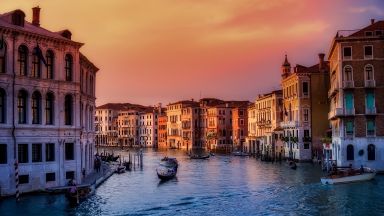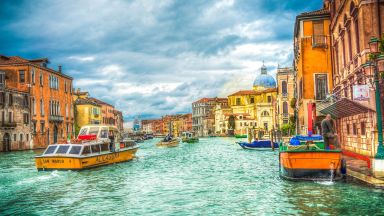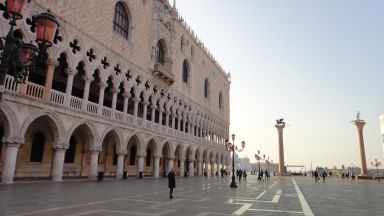Caffè Florian
Café in Venice

Caffè Florian is a coffee house situated in the Procuratie Nuove of Piazza San Marco, Venice. It was established in 1720 and is the oldest coffee house in continuous operation in Italy, and one of the oldest in the world (the oldest being Café Procope founded in Paris in 1686).
The Florian opened with two simply furnished rooms on 29 December 1720 as “Alla Venezia Trionfante” (Venice the Triumphant), but soon became known as Caffè Florian, after its original owner Floriano Francesconi. The Caffè was patronised in its early days by notable people including the playwright Carlo Goldoni, Goethe and Casanova, who was no doubt attracted by the fact that Caffè Florian was the only coffee house that allowed women. Later Lord Byron, Marcel Proust, and Charles Dickens were frequent visitors. It was one of the few places where Gasparo Gozzi’s early newspaper Gazzetta Veneta could be bought in the mid-18th century, and became a meeting place for people from different social classes. In 1750 the Florian expanded to four rooms.
In 1773, Valentino Francesconi, the grandson of Floriano Francesconi, took over the business at the beginning of the 18th century. In 1796, in a European atmosphere characterized by the French Revolution, the Venetian State feared that the revolutionary ideas could spread also in Venice. The Florian, with its international clientele, had become a meeting place for many French Jacobins, so the State Inquisitors obliged Valentino Francesconi to close the café. When the French armies entered in Venice, in May 1797, Valentino Francesconi put down the double-obsolete “Venice Triumphant” sign outside the café and replaced it with one simply bearing the name of his uncle “Florian”.
In 1814, Valentino Francesconi passed the café on to his son Antonio. By 1858, the establishment had passed into the hands of Vincenzo Porta, Giovanni Pardelli, and Pietro Baccanello, and was in need of some restoration. Lodovico Cadorin was commissioned to carry out restoration work and redecorate the interiors. The new rooms were named “Sala del Senato” (Senate Room), “Sala Greca” (Greek Room), “Sala Cinese” (Chinese room) and “Sala Orientale” (Oriental Room). In the 19th century, the Florian played a role in the Italian Risorgimento because the “Senate Hall” was the meeting point for a group of Venetian patriots. This group had a key role in the Venetian Revolution of 1848, which would see Venice temporarily independent from Austria. During the convulsed hours of the Revolution, the Florian hosted the wounded patriots, becoming a temporary hospital. Other restorations occurred at the Florian in 1872 and 1891 when two other rooms were added to the café: la “Sala degli Uomini Illustri” (the Hall of the Illustrious Men) and the “Sala delle Stagioni” (the Hall of the Seasons). In 1920 another room was added: the Liberty Room.
The Caffè Florian appears in our Complete Guide to Visiting Venice!
This website uses affiliate links which may earn a commission at no additional cost to you!
Visiting Caffè Florian
Nearby Attractions
- Procuratie Nuove (0.0) km
Historic Building in Venice - Museo Archeologico, Venice (0.0) km
Museum in Venice - Piazza San Marco (0.1) km
Square in Venice - Museo Correr (0.1) km
Historic Building and Museum in Venice - Procuratie Nuovissime (Newest Procuracies) (0.1) km
Historic Building in Venice - St Mark's Campanile (0.1) km
Tower in Venice - Procuratie Vecchie, St Marks Square, Venice (0.1) km
Historic Building in Venice - Biblioteca Marciana (0.1) km
Historic Building and Library in Venice - Caffè Lavena (0.1) km
Café in Venice - Piazzetta di San Marco (0.1) km
Square in Venice


